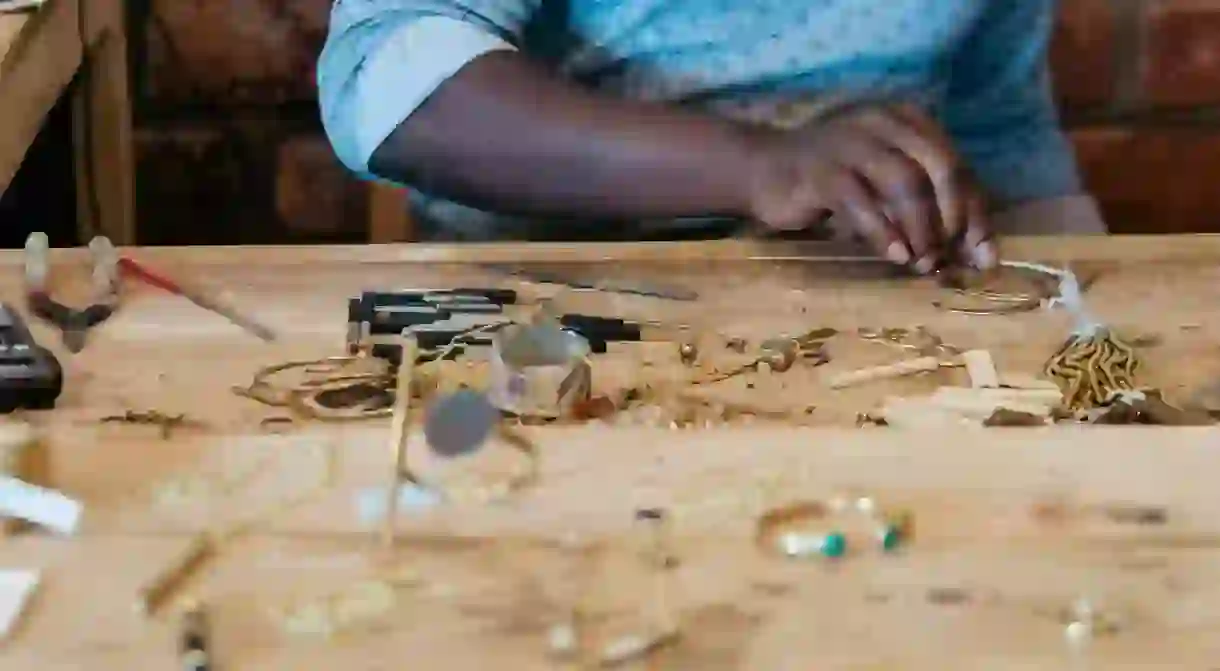Meet Abraham Konga, Designing Sustainable Jewelry in Rwanda

As one of Rwanda’s premier jewelry designers, Abraham Konga is rapidly becoming known for his environmentally friendly, sustainable, and creative designs.
Sitting at his worktable, Abraham Konga carefully and methodically heats metal with a blow torch. “I have to do this part quickly,” he says, motioning towards the section of the earring where he plans to attach a backing. Konga’s deft fingers are used to this work; he has been designing and creating jewelry in Rwanda for over ten years.

Self-taught, Konga’s journey as a designer has been gradual. “I started by winding a wire and making an earring – my girlfriend loved it, and showed it to her other friends. I just got really into it,” he states. “Years later, I taught myself how to cast through Youtube. Youtube is everything.”
His pieces are now much more than twisted wires. Intricate necklaces, elegantly hammered earrings, bold bangles, and clean lines best characterize his recent designs.


Konga’s beautiful pieces are also sustainability focused. Known for taking trash and turning it into treasure, Konga makes necklaces, earrings, bracelets, bangles, and rings primarily (though not exclusively) out of castoff brass padlocks, cow bone, and cow horn.
“My jewelry is upcycled,” he says. “I make jewelry from what has been discarded, or something that would be thrown away… my designs are inspired by the natural world around me so I see beauty in these broken parts. I want to give them a second life.”
Konga’s original store was located right in the center of Kigali, and though he has since moved to the Kimihurura neighborhood, his suppliers and co-artisans remain scattered all over the city. “I source my horn from a cooperative in Kicukiro, and my cow bone from a man named Ibrahim Karangwa in Nyamirambo,” he adds.


His partnerships are due in part to serendipity as well as hard work. After finding some of Karangwa’s bone earrings at a tourist shop in town years ago, Konga knew he had to meet him. He spent months tracking down the bone artisan, before finding him tucked away in bustling Nyamirambo, a neighborhood known for its color, vibrance, and traditional Muslim community. They became fast friends, and Konga began sourcing bone from Karangwa.
“I get the bones from butcheries, slaughterhouses, and restaurants in the area,” explains Karangwa, while setting up his work stool and machinery.
“Once you have the bone, you boil it three times,” he adds, pointing to a boiling pot of water in the corner. “The first and second time remove all the meat remnants. The third time, you boil it with soap to clean it.”


After Abraham brings him almost complete brass metal jewelry pieces, Karangwa cuts and fits sections of bone to line up with the metal. He uses traditional saws and tools, based on a practice he learned while living in the Democratic Republic of Congo, to make sure each piece is completed perfectly.
“This is old school, and he’s the master” says Konga, motioning to Karangwa’s set-up and watching as he saws the newly boiled bone balanced between his feet and the ground. After a few minutes, Karangwa gets up and hands Abraham a few finished bone and brass pendants. Though the pieces are almost identical, there are a few differences here and there. “Since we don’t use machines, and it’s all made by hand, every piece is unique,” notes Konga.


Both of Konga’s stores (situated right next to each other) are must-visit sites for all travelers to Rwanda’s capital; in addition to selling his own unique wares, the shops also showcase other local artists and sell their baskets, jewelry, pottery, and crafts. Konga is committed to training promising jewelry makers around the city, so that his newfound skills will be passed on to the next generation.
Pointing out pieces made by other artists in his store, Konga smiles. “I want to involve my local community, I think that’s a really important part of our growth,” he says.














